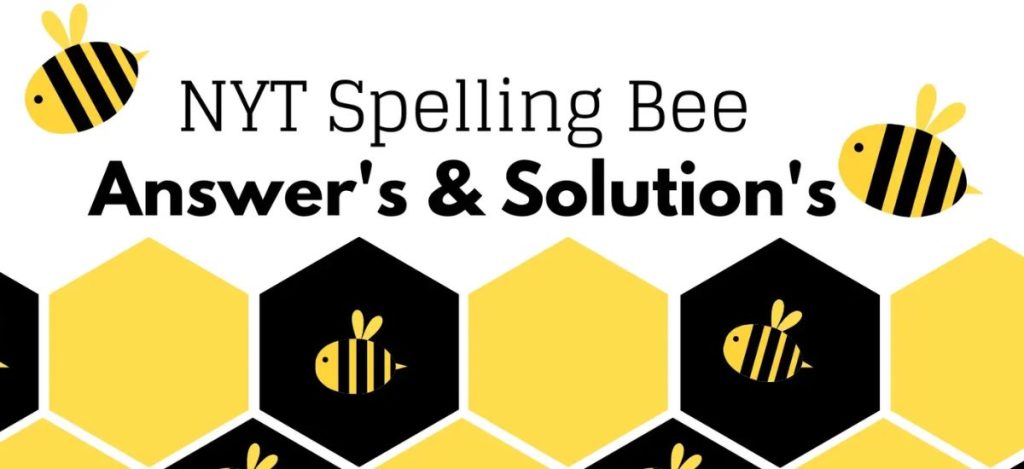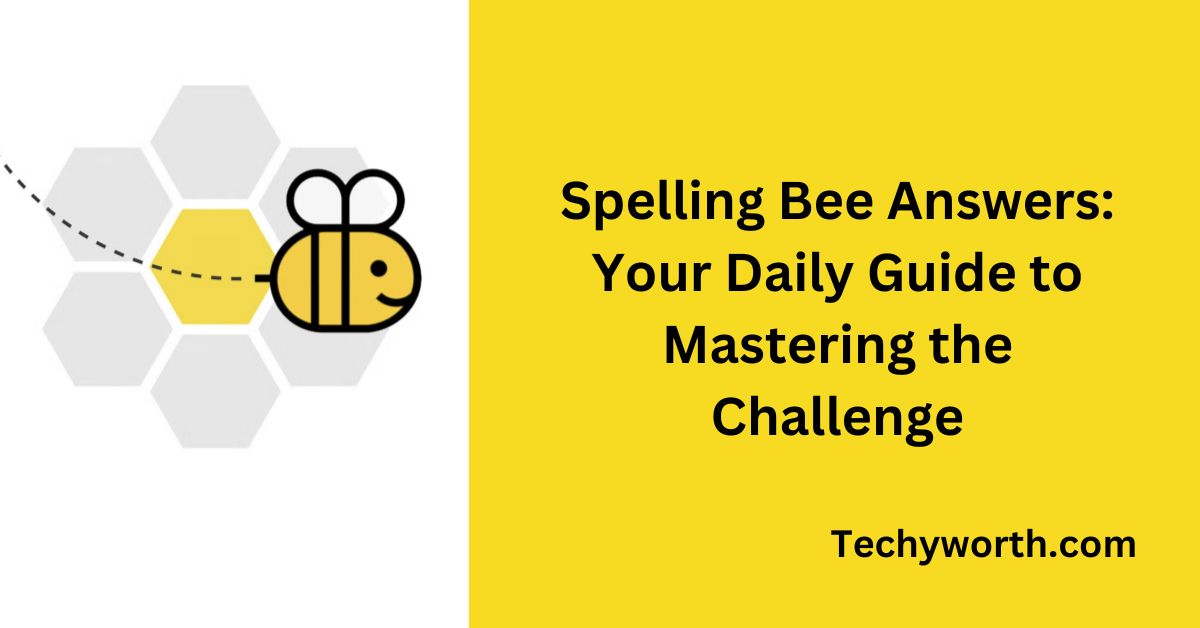Participating in a spelling bee can be both challenging and rewarding, requiring competitors to have a deep knowledge of language, spelling patterns, and word origins. Access to accurate and relevant spelling bee answers is essential for effective preparation, providing insight into commonly featured words, their origins, meanings, and pronunciation. This guide will cover the importance of spelling bee answers, strategies to master them, and resources to improve your spelling skills.
The Importance of Spelling Bee Answers in Competition
Spelling bee answers are the core of any successful spelling bee preparation. They serve as a roadmap for participants, helping them understand which words to study and how to approach each word’s spelling, meaning, and etymology. By studying these answers, competitors gain familiarity with complex words and sharpen their language skills, which is crucial for performing well in high-stakes competitions.
Building Vocabulary and Language Skills
Spelling bee answers provide more than just correct spellings—they help build a vast vocabulary, enhance pronunciation, and improve comprehension of word meanings and usage. This knowledge can benefit participants not only in the competition but also in academic pursuits and personal communication.
Developing Mental Agility and Memory
Memorizing spelling bee answers enhances cognitive skills such as memory retention, concentration, and mental agility. Learning to recall complex words, especially under pressure, sharpens the mind and improves focus, both of which are vital for succeeding in competitive environments.
Effective Strategies for Mastering Spelling Bee Answers
For those preparing for spelling bees, having a strategic approach to studying spelling bee answers can make a significant difference. Here are some tried-and-true methods:
1. Categorize Words by Difficulty
Organizing spelling bee answers by difficulty level can make studying more manageable. Start with simpler words and gradually progress to more challenging ones. This step-by-step approach builds confidence and ensures a solid foundation before tackling advanced vocabulary.
2. Study Word Origins and Etymology
Many words in spelling bees are derived from languages like Latin, Greek, French, and German. Understanding these linguistic roots can make spelling patterns more predictable. Learning word origins not only makes it easier to remember words but also gives clues about pronunciation and meaning.
3. Use Mnemonic Devices
Mnemonic devices are memory aids that help in recalling difficult spellings. Techniques like breaking words into syllables, creating short phrases, or associating words with images make complex words easier to remember. For example, breaking the word “onomatopoeia” into “ono-mato-poeia” can simplify memorization.
4. Practice with Mock Spelling Bees
Participating in mock spelling bees simulates the experience of a real competition, building confidence and helping identify areas that need improvement. By practicing with spelling bee answers in a structured environment, participants can gauge their progress and refine their skills.
5. Regularly Review and Revisit Words
Consistency is key when mastering spelling bee answers. Reviewing words regularly reinforces memory and ensures that knowledge stays fresh. Consider setting aside time each day or week to revisit previously learned words to solidify them in your memory.

Resources for Accessing Spelling Bee Answers
Various resources offer extensive lists of spelling bee answers, helping participants prepare effectively. Here are some popular sources to consider:
1. Official Spelling Bee Websites
National and regional spelling bee organizations often publish official word lists or guides for participants. These lists are valuable study materials as they provide insight into the types of words used in competitions. Examples include the Scripps National Spelling Bee word lists and regional spelling bee guides.
2. Educational Apps and Online Platforms
Several educational apps and online platforms focus on vocabulary building and spelling practice. Apps like Spelling Bee Master, Word Club, and Quizlet provide interactive quizzes, flashcards, and games that feature common spelling bee words, making learning engaging and effective.
3. Spelling Bee Preparation Books
Books specifically designed for spelling bee preparation contain extensive lists of words along with their meanings, etymologies, and pronunciations. Books such as “The Spelling Bee Toolbox” and “How to Spell Like a Champ” are popular choices among competitors for structured, in-depth study.
4. Language Learning Websites
Websites like Merriam-Webster and Dictionary.com provide resources to explore word origins, definitions, and phonetic pronunciations. These websites are excellent for understanding word details that can often appear in spelling bees, such as language roots and variant spellings.
Post You Might Like: Self-Control is Strength. Calmness is Mastery. You – Tymoff
The Role of Spelling Bee Answers in Vocabulary Building
Studying spelling bee answers goes beyond memorizing spellings—it fosters vocabulary expansion and language comprehension. This enriched vocabulary benefits students academically, enhances writing skills, and improves communication. Here’s how spelling bee answers contribute to vocabulary building:
Expanding Word Knowledge
Spelling bee answers introduce participants to a wide range of words, many of which are uncommon in everyday language. Exposure to new words broadens linguistic horizons and helps participants develop a richer vocabulary.
Enhancing Word Usage and Understanding
Learning the definitions and usage of spelling bee answers helps participants grasp how words fit into different contexts. This comprehension enables students to use words more accurately and confidently in their writing and speech.
Supporting Academic Success
A strong vocabulary is essential for excelling in standardized tests, academic writing, and public speaking. Spelling bee answers provide a structured way to acquire this skill, offering a competitive advantage in school and beyond.
Overcoming Challenges in Learning Spelling Bee Answers
Despite the benefits, studying spelling bee answers can be challenging due to the complexity of certain words, their pronunciations, and the vast amount of material to cover. Here are some common challenges and tips for overcoming them:
1. Memorizing Complex Words
Some spelling bee words have irregular spellings or confusing phonetics. To overcome this, break down difficult words into syllables or create associations. Practicing these words regularly helps embed them in long-term memory.
2. Understanding Difficult Pronunciations
Accurate pronunciation is essential in spelling bees, but English often has irregular pronunciations. Using audio resources or practicing with a pronunciation guide can improve accuracy and familiarity with tricky sounds.
3. Retaining Large Volumes of Words
The extensive lists of words to memorize can feel overwhelming. Breaking study sessions into smaller time blocks or focusing on specific word categories each day can make the process manageable and less stressful.

Incorporating Spelling Bee Answers into Daily Practice
Incorporating spelling bee answers into daily routines makes studying feel less like a chore and more like an enjoyable habit. Here are some practical ways to make spelling practice a part of everyday life:
1. Set Daily Word Goals
Aim to learn a set number of words each day. Starting with a small goal, such as five words, and gradually increasing the count can make the task manageable and motivating.
2. Use Words in Conversation and Writing
Applying newly learned words in conversations or writing exercises reinforces their meanings and correct usage. This practice makes learning relevant and practical, deepening understanding.
3. Engage in Group Study
Studying with others, whether friends or family members, adds an interactive element to learning. Group study sessions offer opportunities for peer feedback, sharing mnemonic devices, and building confidence in a supportive environment.
The Cognitive Benefits of Studying Spelling Bee Answers
Learning spelling bee answers enhances cognitive abilities beyond language skills. Engaging in this form of study has been shown to support cognitive development in various ways:
1. Boosting Memory
Memorizing spellings, definitions, and pronunciations requires focus, reinforcing both short-term and long-term memory skills. This mental exercise is beneficial for all areas of learning, not just language.
2. Improving Concentration and Attention to Detail
Spelling bees demand high levels of concentration and precision. Regularly practicing spelling bee answers improves participants’ ability to focus on tasks and pay attention to details.
3. Fostering Analytical Thinking
Understanding word roots and language patterns requires analytical skills. Spelling bee answers often contain linguistic puzzles that stimulate critical thinking, problem-solving, and pattern recognition.
The Future of Spelling Bees and the Relevance of Spelling Bee Answers
As spelling bees continue to evolve, incorporating new words and reflecting “changes in language“, spelling bee answers remain relevant as the foundation for effective preparation. By using the latest resources and adapting study techniques to fit current trends, participants can stay competitive in the dynamic world of spelling competitions.
Also Read: Rena Monrovia When You Transport Something By Car …
Summary of Effective Study Techniques for Spelling Bee Answers
To enhance your study routine, here is a quick reference table summarizing some of the best techniques to prepare effectively for spelling bees.
| Technique | Description |
|---|---|
| Categorize by Difficulty | Start with simpler words, gradually advancing to more challenging ones for steady progress. |
| Learn Word Origins | Study word roots, especially Latin and Greek, to predict spelling patterns and meanings. |
| Use Mnemonics | Employ memory aids like breaking words into syllables or associating words with visuals or stories. |
| Practice Mock Spelling Bees | Simulate competition settings to build confidence and test your recall under pressure. |
| Review Regularly | Consistently revisit learned words to reinforce memory and maintain retention. |
| Set Daily Goals | Aim to learn a set number of words each day, starting small and gradually increasing. |
| Engage in Group Study | Study with friends or family to share techniques and boost learning in a supportive setting. |
| Apply Words in Context | Use learned words in conversations or writing to strengthen understanding and practical use. |
| Use Audio Resources | Listen to pronunciations of challenging words to improve accuracy and confidence. |
| Take Regular Breaks | Balance study sessions with breaks to prevent fatigue and enhance focus and retention. |
These strategies provide a comprehensive approach to mastering spelling bee answers, helping you to build a strong vocabulary, improve focus, and excel in competitions.

Conclusion:
Mastering spelling bee answers is key to performing well in spelling bees, enabling competitors to build a strong vocabulary, sharpen their focus, and develop an in-depth understanding of language. With consistent practice, strategic study techniques, and access to reliable resources, anyone can improve their spelling skills and excel in spelling competitions. Embracing the study of spelling bee answers goes beyond winning—it’s a pathway to enhanced language skills and lifelong learning.
Read to Know About: Photeeq: Mastering the Art of Photography with Expert Advice
Frequently Asked Questions (FAQs)
1. What are spelling bee answers?
- Spelling bee answers refer to the correct spellings and pronunciations of words commonly used in spelling competitions, helping participants prepare effectively.
2. Where can I find reliable spelling bee answers?
- Official spelling bee websites, vocabulary apps, and spelling preparation books provide accurate lists of words and their correct spellings.
3. How can I use spelling bee answers to improve my vocabulary?
- Studying spelling bee answers helps expand vocabulary, understand word origins, and enhances language comprehension skills.
4. What are some common challenges with learning spelling bee answers?
- Memorizing complex spellings, understanding difficult pronunciations, and retaining a large number of words are typical challenges.
5. Are there apps that help with spelling bee answers?
- Yes, apps like Quizlet, Spelling Bee Master, and Word Club offer practice tests, flashcards, and word lists for effective preparation.
6. How does knowing spelling bee answers benefit cognitive skills?
- Learning spellings improves memory, focus, and analytical skills, helping students develop critical thinking.
7. What’s the best way to memorize challenging spelling bee answers?
- Using mnemonic devices, breaking words into syllables, and practicing regularly are effective ways to memorize difficult words.
8. How can I practice spelling bee answers under competition conditions?
- Practice mock spelling bees or timed drills to simulate real competition and improve confidence and speed.
9. Do spelling bee answers help with academic success?
- Yes, mastering spelling bee answers improves vocabulary and writing skills, which supports overall academic performance.
10. Can group study help with learning spelling bee answers?
- Studying with a group encourages knowledge sharing, peer support, and can make learning challenging words more enjoyable.
